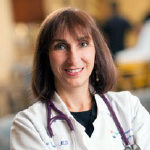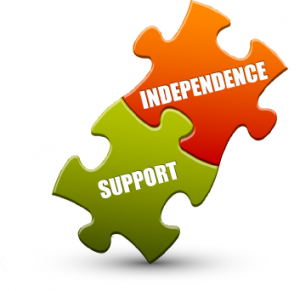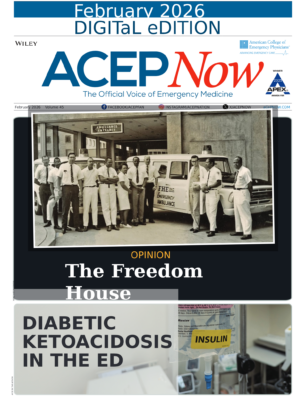There are many issues facing emergency medicine, but the biggest issue for me is physician satisfaction. Happy doctors make happy nurses and happy patients. There are many metrics that emergency physicians face, from door-to-doc to door-to-antibiotics and door-to-balloon.
I want emergency physicians to have the best door-to-home metrics, feeling after every shift that we made a difference—because we do.
There are many employment models in emergency medicine, and I want to share my story of going from a large group to an independent group to creating a setting that provided me with the best of both worlds. While I am protective of my practice model, I don’t think it matters where emergency physicians work as long as they are highly satisfied.
I started my career in emergency medicine working for a large group practice at Mercy Hospital in San Diego. I felt like I won the lottery working at a community hospital with all the fixings of trauma, academics, inner city, and action. I was even given a special role as educational director. While I became very committed to my hospital and community, my colleagues and I became disillusioned with our management group. The group sold for several million dollars, and this had a negative effect on our income. The cost of the sale was paid for by the labor of the working physicians.
At that point, we lost a few doctors, but there was a core of us who were committed to the institution and our community; we didn’t want to leave. The final straw came when the group sold for a second time. Our doctors were beyond angry. Each monthly meeting was contentious and emotionally exhausting. At $78 per hour, we did not care about excuses of bad payer mix, improved productivity, or future solutions. We hated the current buyer, whoever it may be, as we lost faith and wanted no part of any more sales.
It was Dec. 31, 2004, and each doctor was told to either sign a contract with the new buyer or get replaced. I didn’t want to sign. However, at the last moment, and after some sweet phone calls from trusted colleagues, I was the last to sign, but there was a catch. My colleagues and I added a clause that would free us in one year and would allow us to compete for the business—and compete we did. We spent the year creating a business plan and securing our future. We won our bid for independence. It was like the Fourth of July, breaking off from the taxing king to form our own country. Overnight, we went from the most disgruntled group of doctors to the happiest group ever. We all agreed to go without pay until our accounts receivable came through, and in a short time, we were making much more money and were more productive.
As a new independent group, we learned about the business of emergency medicine and the art of negotiations. We are a much more lean and efficient organization than when we were under a large group. We have no recruiters, regional directors, or layers of management. Being cost-conscious is crucial, as we have a very poor payer mix and resist taking hospital stipends. Our expenses are minimal, and our provider salaries are not considered a line-item expense but group profit. We know that no one cares more about our money than we do.
We do not have service lines and official vertical integration like large groups have, but we have the best working relationship with our hospitalists and specialists. In the middle of the night, I can call Seth, my trauma surgeon, and Mark, my urologist, for a dual consultation for possible Fournier gangrene and have the patient in the operating room within an hour. I think an important indicator of quality medical care is collaboration of the medical professionals. Unfortunately, there is no Centers for Medicare & Medicaid Services measure for that.
We are forever grateful to our administration that gave us the opportunity to create our group and makes it a point to respond quickly to various requests from the hospital or medical staff, as they are not just business collaborators but friends.
My physicians still hold resentment to the large group we broke off from. The experience was like going through a divorce, and their blood would boil at a suggestion of joining a large group again. Yet there was something about the large group that I missed. I enjoyed the collaboration between emergency physicians from different hospitals. If only independent emergency physicians could get together, then we would have the best of both worlds, small group independence plus large group collaboration. Emergency groups are resistant to sharing anything with one another due to competition and fear of “stealing” contracts. That’s how the idea for Independent Emergency Physicians Consortium (IEPC) was born.
IEPC was established in 2012 and brings stability and support to more than 30 emergency departments in California. IEPC assists independent emergency physicians with sharing best clinical and business practices, annual surveys, marketing, recruitment, producing individual ED annual reports, human resources information, confidential consultation from hired hospital administrator and collective shared expertise. Our members believe in preserving their independent status and sign strong nondisclosure agreements that allow for trust in sharing sensitive business and clinical data. IEPC does not do any individual group management. Each group preserves its own billing, malpractice, pay model, and culture.
Some believe that independent physician groups will be extinct and cannot adapt to the ever-changing health care environment. My colleagues and I at IEPC disagree. We are well-established emergency physicians and hire some of the brightest residents. Our groups have survived managed health care, the Affordable Care Act, hospital name changes, several administrations, and the consolidation craze. Our emergency department is our home away from home, our business.
All emergency physicians need to decide for themselves what practice setting they enjoy the most. The business side of emergency medicine is a fraction of the total picture of what we do, and I realize that some doctors do not want the responsibility of being a business owner. The most important factor for the survival of our specialty and the groups within it is physician satisfaction. We need happy doctors.
 Dr. Lev is president of IEPC.
Dr. Lev is president of IEPC.
Pages: 1 2 3 | Multi-Page






No Responses to “Opinion: Independent Emergency Group Practice Model Boosts Physician Satisfaction”